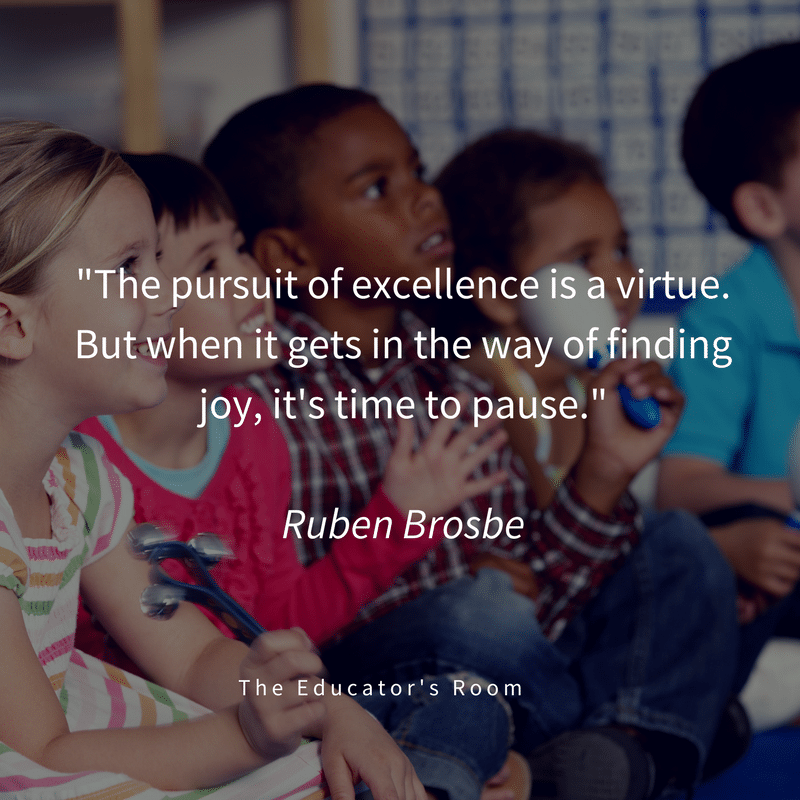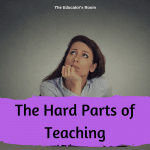I don’t blog as much as I would like these days, but in my first year of teaching, I kept an almost daily record of my experiences. My family and friends would read these posts, and for the most part feel very sad for me. But my uncle, a teacher, had a different reaction. I still remember him saying to me that year, “It doesn’t sound like you’re having very much fun.”
Yeah. No kidding.
But I knew what he meant. And ten years later his words still resonate as I think about finding joy in the work that I do.
Teaching can be an emotional rollercoaster. It can be frustrating, exhausting, exhilarating, and everything in between. But at its core, I truly believe that teaching (and learning) should be joyful.
It’s sometimes hard to find joy in my classroom due to the system and society we teach in. Where is the joy in a kid who comes to school hungry? Or a kid who’s homeless? A kid whose family is being broken up by the state?
Where is the joy in the pressure of high stakes testing? There’s little joy in a huge pile of expectations (design an interdisciplinary curriculum, adapt my teaching for the range of learners, design assessments, grade assessments, plan field trips, make family phone calls…) that isn’t counterbalanced by much support.
But the lack of joy in these aspects of my teaching makes the need for joy all the more crucial.
There’s a quote from Haim Ginott that illustrates why:
“I’ve come to a frightening conclusion that I am the decisive element in the classroom. It’s my personal approach that creates the climate. It’s my daily mood that makes the weather. As a teacher, I possess a tremendous power to make a child’s life miserable or joyous. I can be a tool of torture or an instrument of inspiration. I can humiliate or heal. In all situations, it is my response that decides whether a crisis will be escalated or de-escalated and a child humanized or dehumanized.”
For my students to experience joy, I must bring joy to the space. If I treat the day like a marathon of learning objectives instead of a journey of discovery, then they will experience it that way. If I exhaust my patience and lose my temper throughout the day, they will experience the day as a gauntlet of reprimands and lectures. I must decide whether my classroom is a community of joy or a site of stress and anxiety.
Childhood is such a special and precious time. Lately, there are times when I feel like I am not focused enough on safeguarding the magical innocence of this time in my students’ lives.
For kids of color, in particular, the world provides an onslaught of terror and danger. My students are being forced to grow up too early. George Zimmerman, Donald Trump, and a racist education system are already conspiring to steal their childhoods.
[bctt tweet=”Thus joy is not just a nice thing to have in the classroom. It’s an equity issue. ” username=””]
And yet, to return to the beginning: How do I find and nurture joy in work that can be so stressful?
First of all: Kids are great. They’re frustrating, strange, and sometimes downright rude. But also they’re great. No matter what, they’re way better than adults!
Secondly: Treat each day as an experiment. I can’t tear myself down for every mistake and incomplete task. Instead, I can ask what happened? And what can I try differently?
I have a tendency to look for new tools and strategies, but I often attach high stakes to them. “This has to be the way to get Student A to participate in class! This has to be the way to help Student B comprehend the grade level text! This has to be the way to help the students resolve conflicts!” I can’t continue to treat each new strategy as an all or nothing venture. These experiences can bring joy instead of stress if I approach them through a lens of creativity and inquiry.
Lastly: Celebrate. I get to be a teacher! I get to shape the future! This alone is worth celebrating. But I want to celebrate the little things too. For example instead of focusing on the one kid who enters the classroom grumpy and ready to fight, celebrate the 23 kids who circled up for the morning meeting to start our day as a community. Celebrate the child who does their homework every day. Celebrate the child who never completes homework, but tries their best during a math lesson. Celebrate the kid who opens up and shares a story about their weekend. Getting to be a significant person in a young person’s life is a privilege and a joy by its very nature.
I think many teachers are perfectionists by nature. We want the best from our teaching because we want the best for our students. The pursuit of excellence is a virtue. But when it gets in the way of finding joy, it’s time to pause.
It is my tenth year as an educator. My work is still stressful and filled with ups and downs. What is also still true as ever is this: Every day there’s joy in the work we do.







